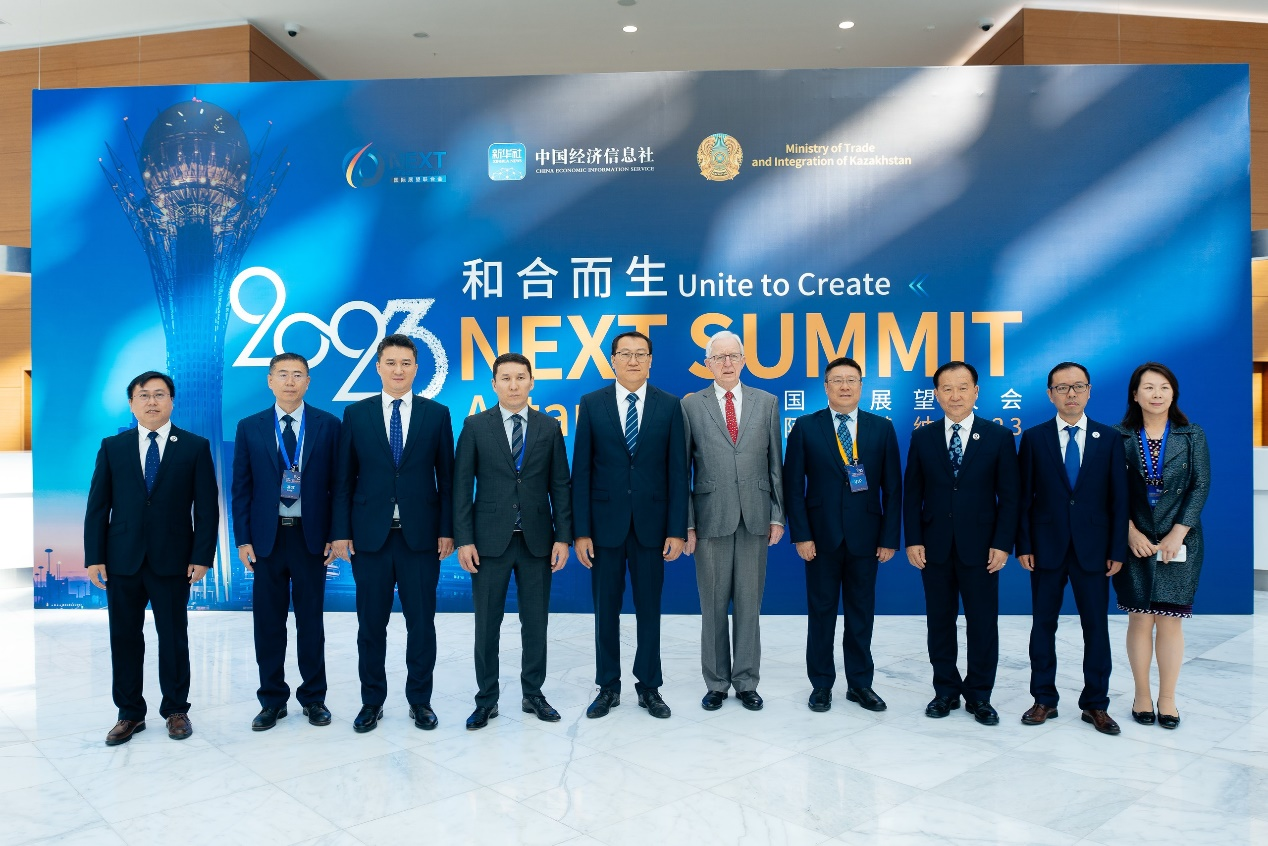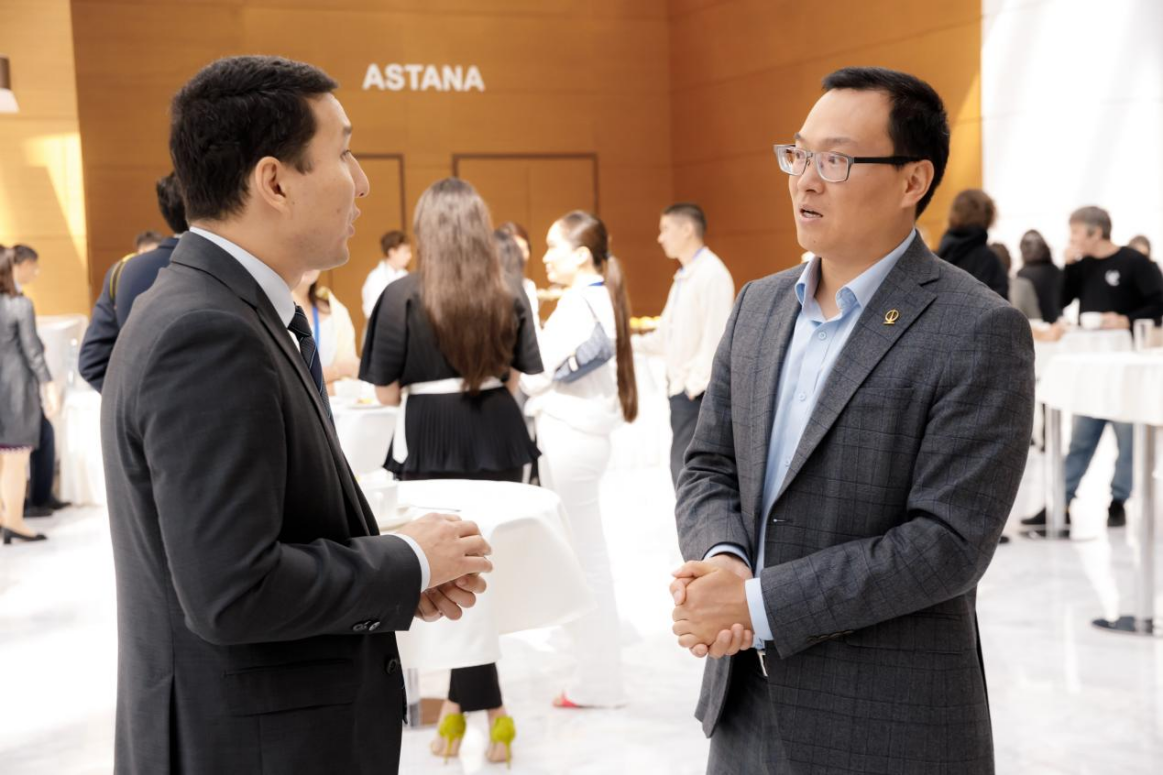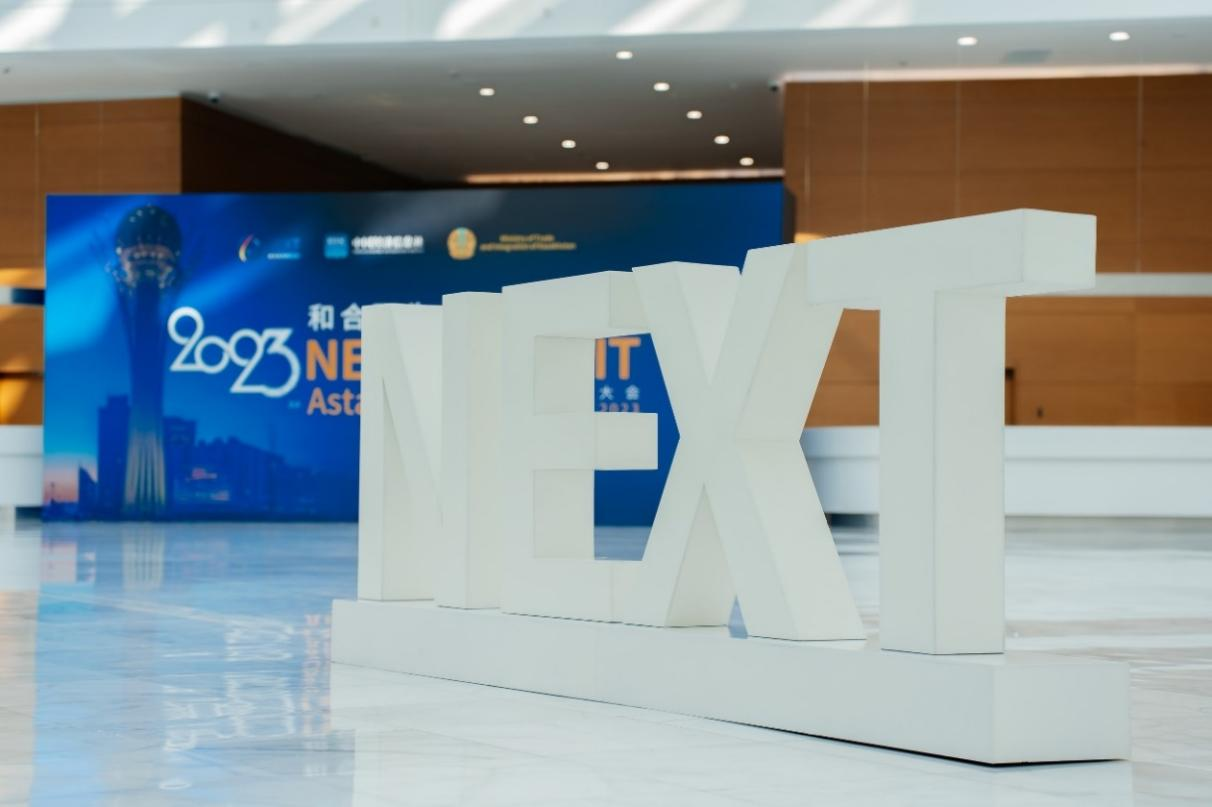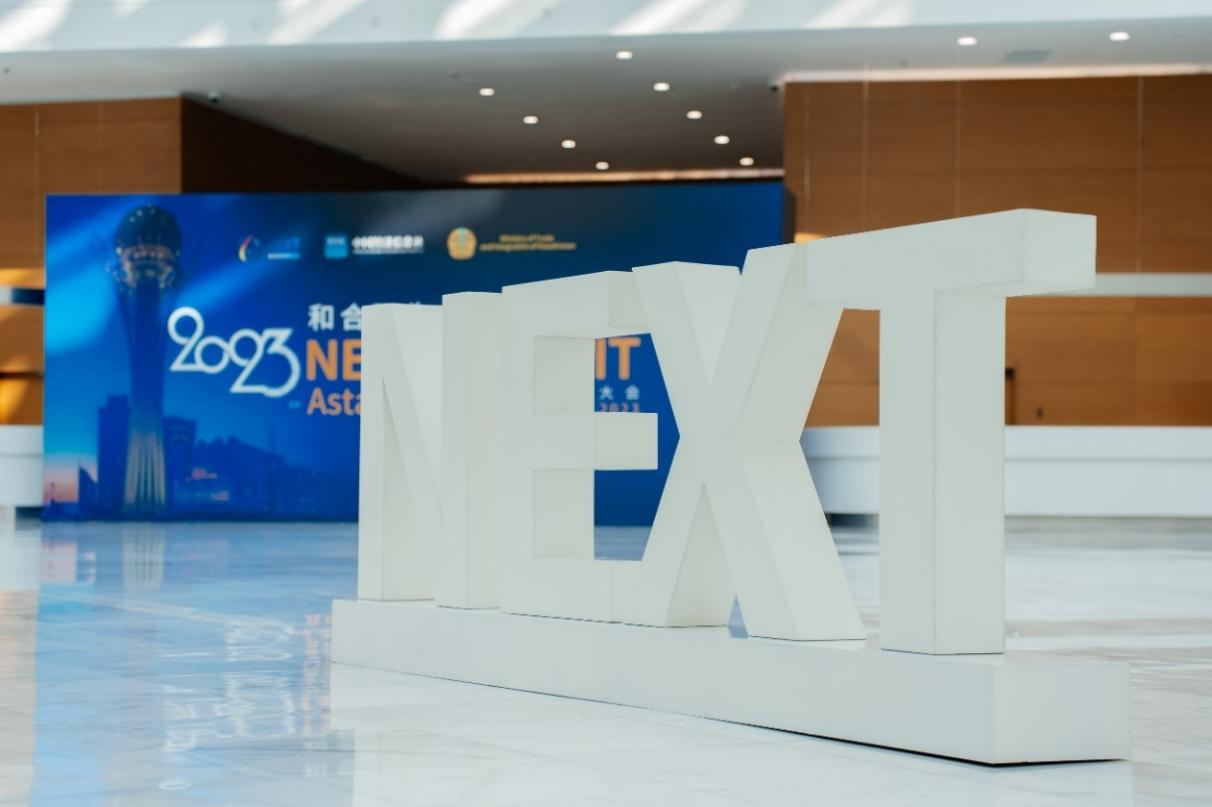
Group photo shows some participants at the main forum.
ASTANA, Aug. 28 (Xinhua) -- The 7th NEXT Summit (Astana 2023) was held from August 21 to 25 through a combination of in-person and online formats, with the main forum taking place on August 22 in Astana, the capital of Kazakhstan.
The summit was co-hosted by the NEXT Federation, China Economic Information Service of Xinhua News Agency, and the Ministry of Trade and Integration of Kazakhstan.
Themed "Unite to Create", the summit aimed to enhance international understanding and confidence in promoting global innovation, cooperation, and sustainability. The goal was to identify project opportunities and strategic prospects in international cooperation, expand a platform for exchanging and collaborating on high-level talents, knowledge, technology, and funding in various industries, and extend the network of global partnerships.

Photo shows in-depth discussions among participants during the summit.
The main forum of the summit encompassed an opening ceremony, keynote speeches, and a global project roadshow, while six online thematic sub-forums were held. Dignitaries, experts, scholars, and business leaders from over ten countries and regions, including China, Kazakhstan, Indonesia, New Zealand, Singapore, the UK, Germany, Egypt, Pakistan, Armenia, and Malaysia, delivered cutting-edge speeches and shared case studies in various industrial fields. The summit explored innovative enterprises with leadership capabilities, the forefront dynamics of key industries, the latest technological research findings, effective smart practices, and directions for international cooperation.
-- Focusing on global innovation, cooperation, and sustainability
Tony Browne, chairman of the Council of NEXT Federation and former New Zealand Ambassador to China, introduced the value and framework of the NEXT Summit in his address. He emphasized the summit's aspiration to gather outstanding leaders, professionals, and scholars from around the world to explore the global values of innovation and cooperation and to promote sustainable development. The NEXT Federation highlighted its dedication to innovation, cooperation, and sustainability, aiming to facilitate in-depth collaboration among industries in areas of common concern and to create more opportunities through innovative collaborative solutions.
During the keynote address, former Prime Minister of New Zealand, Rt Hon Dame Jenny Shipley, called for unwavering efforts to achieve sustainable development and global cooperation in this era filled with opportunities and challenges. She emphasized that despite setbacks, people must push forward fearlessly and persevere in their pursuit of progress, contributing to sustainable development and global cooperation.
In his keynote speech, Saleem Mandviwalla, Chief Whip of the Senate of Pakistan and Chairman of the Senate Standing Committee on Finance, Revenue, and Economic Affairs, stressed the close connection between cooperation and sustainable development at pivotal historical moments. Sustainable development is not just the responsibility of individual countries or regions; it is a shared global mission. He emphasized the need for collaboration in environmental protection, economic growth, and social equity to create a better future for the next generation.
Hammam Riza, rotating president of the Global Advisory Committee of the NEXT Federation and chief scientist of the Indonesian Agency for the Assessment and Application of Technology, highlighted the power of innovation in his online address. Drawing on the example of agriculture, he emphasized the importance of innovation for sustainable development, particularly in addressing challenges such as food security and environmental sustainability. Integrating technology and agriculture can lead to smarter and more efficient agricultural models, providing sustainable solutions globally.
-- Discussing the Belt and Road Initiative and Global Development Initiative
Essam Sharaf, rotating president of the NEXT Federation and former Prime Minister of Egypt, shared the facts and values of China's modernization in promoting world cooperation and development. He highlighted that global public goods like the Belt and Road Initiative and Global Development Initiative demonstrate that China's emphasis on cooperation and active participation in globalization not only contributes to national prosperity but also injects new vitality into global development.
Zhao Dali, executive vice president of China International Public Relations Association, emphasized the role of cultural exchanges in deepening understanding between nations and promoting people-to-people connections. In this diverse and globalized era, advocating for equal dialogue and mutual learning among different civilizations is crucial. The ten years since the launch of the Belt and Road Initiative have shown that cultural exchange can break barriers, promote cultural integration, and create a favorable environment for global peace and development.
Grigor Petrosyan, chairman of the Armenian Peace Committee, expressed that the ten years of the Belt and Road Initiative demonstrate the universal pursuit of peace and the key role of cooperation in achieving it. A robust network of cooperation can harness the strength of the international community to jointly address challenges and promote peace and stability. In the ever-changing international landscape, countries need to collaborate, enhance dialogue, seek consensus, and achieve cooperation. The modern age of information offers evolving ways of collaboration, as technological advancements foster closer global connectivity and provide more opportunities for cooperation. He urged leveraging modern technology to establish collaboration platforms and promote cooperation across various sectors.

Photo shows the main forum of 2023 NEXT Summit.
-- Focusing on investment, trade, and sharing industry cooperation opportunities
Kairat Torebayev, Deputy Minister of Trade and Integration of Kazakhstan, highlighted Kazakhstan's active promotion of trade and integration strategies aimed at achieving sustainable development and global cooperation. In this vibrant and opportune era, Kazakhstan is committed to creating an open and friendly investment and trade environment. The country strives to build a connected regional economic cooperation framework, enhance industrial competitiveness, and play a more important role in the global value chain through innovation-driven endeavors.
Sultan Kinzhakulov, Deputy Chairman of the Foreign Investment Council under the Ministry of Foreign Affairs of Kazakhstan, described Kazakhstan's resilient economic growth in recent years. He emphasized that Kazakhstan is fostering an open economy, optimizing investment regulations, streamlining processes, and offering investors a convenient and efficient business environment. Encouraging domestic and international enterprises to collaborate in high-tech fields, Kazakhstan aims to jointly develop forward-looking solutions to global challenges. Kazakhstan's vision revolves around cooperation and innovation, dedicated to creating a prosperous and harmonious future.
Zhandos Temirgali, Deputy Chairman of Kazakhstan National Investment Company, underscored the vital role of investment in national development. Investment not only brings capital flow but also introduces new technologies and concepts, driving industrial upgrading and innovative growth. He provided detailed insights into Kazakhstan's investment development environment and major directions.
Saule Sabyr, Advisor to the Minister of Agriculture of Kazakhstan, highlighted the significance of agriculture in global development. With the application of new technologies such as digitization and intelligent solutions in the agricultural sector, farmers gain more opportunities. Exploring cooperative models to invigorate sustainable development in agriculture is essential. She advocated strengthening cross-border partnership and cooperation to advance sustainable development in the agricultural sector.
Dong Xuebing, deputy director of the Regional Coordination Development Research Center and executive vice president of the China Academy of West Region Development at Zhejiang University, proposed policy recommendations to accelerate international cooperation in the China-Central Asia digital economy. He called for accelerated digital transformation, comprehensive digital economic cooperation, and exploration of digital economic trade rules to enhance international digital economic governance involving China.
-- Global industry experts share collaboration resources and project opportunities
During the "Global Project Roadshow" segment, Assan Sultangali, vice president of Agroexpo in Kazakhstan, Simon Malpas, CEO of Kitea HealthTech Ltd. in New Zealand, and Chen Shibo, chairman of Yiluyouxuan (Beijing) Fresh Food Co., Ltd. in China, shared projects in digital agriculture, smart health, and international high-end agricultural product selection and procurement.
From August 21 to 25, the summit featured specialized forums focusing on ESG development trends, prospects of the digital economy, energy and artificial intelligence, foresight of the health industry and food security and agricultural modernization. These forums aimed to provide a platform for exchanging and collaborating on high-level talents, knowledge, technology, and funding in various industries, contributing to the expansion of global cooperation networks.
Since 2017, the NEXT Summit has successfully convened six sessions and it has become a brand platform for international exchange and cooperation, embracing GMABC integrated service model, coordinating government, media, academy, business, and community resources to provide a vital communication bridge and service platform for practical cooperation in policy communication, project promotion, technical exchange, personnel interaction, and international communication.
The official website of the summit is www.nextsummit.org, where detailed information can be accessed.
(Contributed by Zhang Jiye, edited by Bao Nuomin with Xinhua Silk Road, baonuomin@xinhua.org)




 A single purchase
A single purchase









